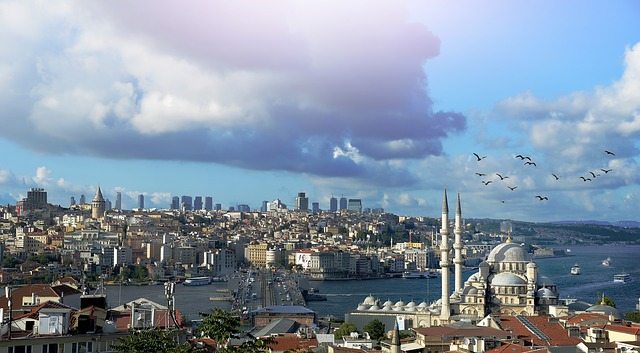ISTANBUL – Russia and Turkey are working on a simplified customs system in order to overcome the ongoing trade row between the countries. Russian and Turkish foreign ministers also emphasized the friendship and significant cooperation between the two neighbors.
The Russian Foreign Minister paid a one-day working visit to Turkey on Tuesday where he met his Turkish counterpart Ali Babacan in Istanbul. The two ministers had discussed the trade row, recent developments in Caucasus, and Iran and Iraq.
Russia was not discriminating against Turkey in the trade relations between the countries, hit by a recent customs dispute, Lavrov told the joint conference with Babacan, adding Russian customs authorities were working to simplify their bilateral customs system.
Hundreds of trucks transporting Turkish exports to Russia have been held at the country’s checkpoints for up to four weeks, costing exporters billions of dollars in losses.
The row has triggered speculation that Russia is trying to punish Turkey for allowing U.S. warships carrying aid to Georgia to pass through the Bosporus to the Black Sea.
Lavrov, however, denied that stricter Russian controls on Turkish imports are politically motivated, underlining Russia’s commitment to reach the 25-billion-dollars trade volume target in 2008.
He said some countries had breached customs regulations prompting Russian authorities to take more stringent measures.
Babacan said he believed that trade problems between Turkey and Russia would be overcome with a flexible attitude and the cooperation of Russia.
“We discussed in a sincere and constructive way the problems caused by keeping and checking Turkish products at Russian customs gates longer than usual,” Babacan told the conference.
SUPPORT TO CAUCASIAN PLATFORM
Russia also reiterated its support to the Turkey-sponsored idea of forming a Caucasian stability and partnership platform.
“We have also agreed to further develop cooperations (in the Black Sea) such as the Black Sea Economic Cooperation (BSEC)”, he said.
Turkey had offered to form a Caucasus alliance to contribute peaceful solutions to the conflicts in the region. The alliance is envisaged to bring together Russia, Turkey, Georgia, Armenia and Azerbaijan, though the task seems to be hard given the bilateral issues between these countries.
Lavrov said some conditions should be met in order to take part in such a formation. A similar comment was also made by the Georgian Foreign Minister Eka Tkeshelashvili who met Babacan on Sunday.
CRITICISM FOR NATO
Turkish and Russian top diplomats also agreed to maintain security and peace in the region, adding that international responsibilities were violated and attacks were staged on South Ossetia.
“Under those circumstances recognition of independence of Ossetia and Abkhazia was the only way out,” Lavrov added. He said recognition would not only protect the security of Abkhazia and South Ossetia but also it would be the only alternative for those people to pursue their existence.
He also reiterated Russia’s support for sending an international police mission to Georgia to help maintain security around South Ossetia and the similarly secessionist region of Abhkazia.
“We are in favor of an international police mission in the security zone, especially in the framework of the OSCE (Organization for Security and Co-operation in Europe),” the Russian minister said.
Lavrov criticized NATO members for arming Georgia ahead of last months conflict over a rebel region.
“International agreements were violated when Georgia was given arms… In practice, it was NATO countries who were arming (Georgian President Mikheil) Saakashvili,” Lavrov said.
Lavrov said Moscow had no intention of keeping its forces there “forever”.
STRESSING GOOD RELATIONS
Both ministers also underlined the relations between two countries based on friendship and cooperation.
Babacan said the two countries’ have been cooperating on energy, and hoped that new joint projects would be implemented in the future.
“Turkey has a key position in transferring oil and natural gas of Russia and other producer companies in the region to consumer markets safely and economically,” he said.
Lavrov said the relations between two countries are intact and acknowledged Turkey’s responsibilities as a NATO member.
Source : Hurriyet





